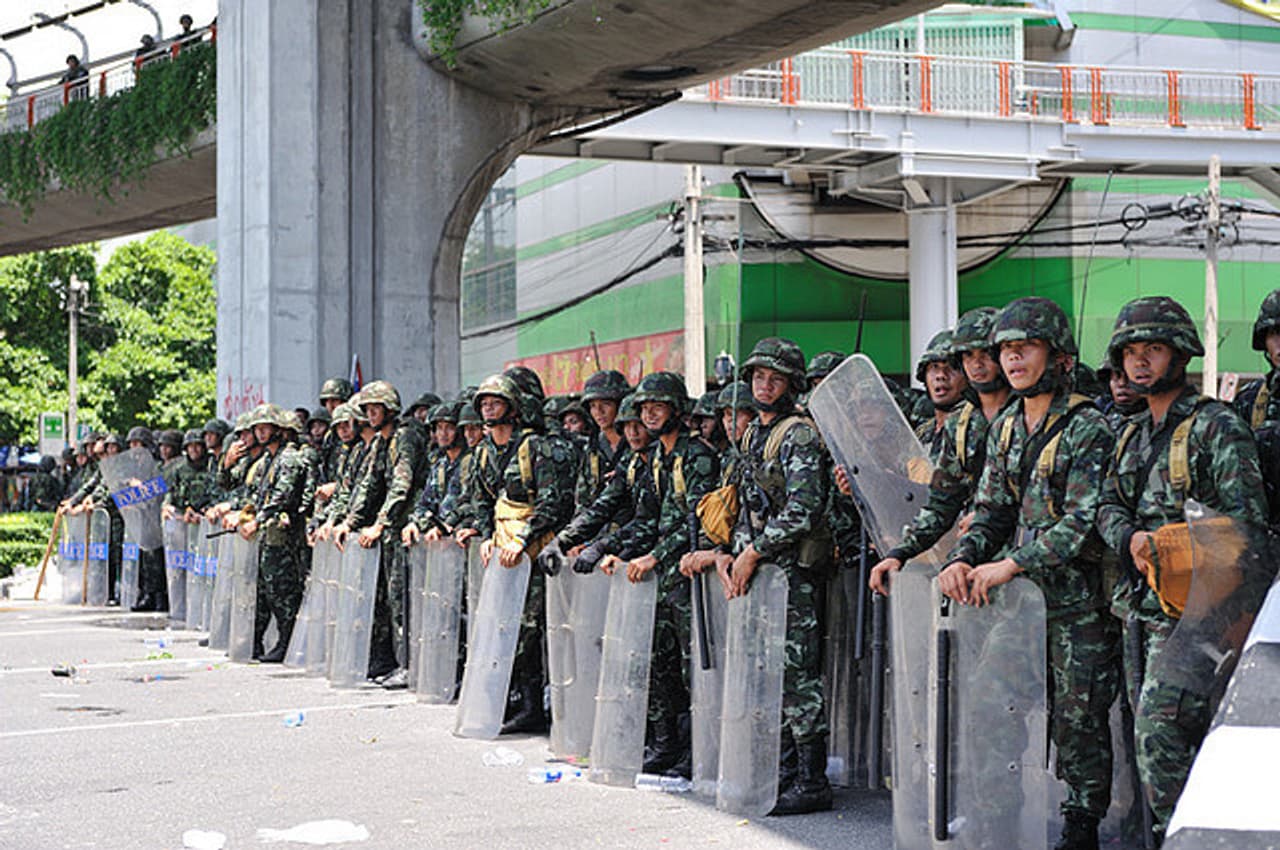
Will Thailand’s up-coming election bring an end to the political crisis?
Thailand might be preparing for an election, but with censorship and political intimidation rife, stability still seems increasingly remote.
After months of political posturing, a date for a general election was finally fixed for Sunday July 3.
But the turbulent seven days that followed the announcement served only to sum up the strife that has torn Thai society apart for the last five years. In just the first week of the run-up to the election there was an attempted assassination of an opposition MP, a police investigation into a respected academic’s “anti-royal” comments; and the jailing of two leaders of the opposition ‘Red Shirt’ movement.
The unrest dates back to one key event: the military coup of September 2006 that threw out Thailand’s democratically elected, though controversial, prime minister, Thaksin Shinawatra. In his place, the Thai Army stepped back into politics. By 2008 it had installed the Abhisit-led Democrat Party.
Thousands of Thais took to the streets in protest as the ‘Red Shirt’ movement gained popularity, and started calling for new elections. But the demonstrations were met with military violence. Last year saw the worst of this when 93 people died in Bangkok – including journalists and medical workers – and many more were injured in the bloodiest street protests modern Thailand had ever witnessed.
The crackdown did not stop there. Since April 2010 the government has embarked on a coordinated programme of censorship. Dozens of opposition radio stations have been closed and thousands of websites blocked. There has been a sharp – and sinister – increase in the number of arrests under the nation’s draconian lese majeste laws, designed ostensibly to prevent an attack on the dignity of the Thai King.
On 29 April 2010, Thai businessman Wipas Raksakulthai was arrested after he posted a comment on Facebook allegedly insulting the King. The arrest prompted Amnesty International to list Thailand as holding a prisoner of conscience for the first time in 30 years. And it is not just businessmen who have been targeted. Opposition leaders, such as the trade unionist, Somyot Pruksakasemsuk, or the leftwing leader, Surachai Sae Dan have also been arrested under the law.
The liberal news website Prachatai (whose own editor is facing a possible 50 year prison sentence for lese majeste-linked offences) recently posted a list of the more high-profile cases. “How many people are under LM surveillance, have cases against them that they do or don’t know about, how many sit in jail without being charged, await trial, or are already convicted nobody knows exactly,” he said.
But it is as much state inaction as action that is stifling democracy in Thailand. Little has been done to investigate deaths that occurred during anti-government demonstrations in Bangkok in 2010. And a few months ago, when a secret file from the Thai equivalent of the FBI – the DSI – was leaked implicating the Thai Army in the deaths of several unarmed civilians at Bangkok’s Wat Prathum temple, nothing was done. To date, no-one has been charged.
The DSI did investigate the death of a Reuters cameraman, Hiro Muramoto, who was shot and killed during a clash between anti-government protesters and Thai troops in April 2010. At first the DSI blamed the Thai Army. But it changed its tune following a Thai police officer’s examination of photos of Hiro’s corpse.
A committee set up by Prime Minister Abhisit Vejjajiva to investigate last year’s events is being hindered by the army, which has refused to co-operate. This week the Paris-based International Federation for Human Rights released a damning critique of the glacial pace of this investigation, pointing out that not even comprehensive autopsy reports had yet been released.
Thailand’s problems have not only been domestic. In the last two years of the Abhisit-led regime a border conflict has broken out with Cambodia that has led to several deaths on both sides. Focused on the status of the Preah Vihear temple – a site acknowledged as being part of Cambodian territory by the International Court of Justice in 1962 – Thai nationalists have been provoking trouble with the Cambodians.
Earlier this year, a group of these nationalists, including an MP from Abhisit’s Democrat Party, walked directly onto Cambodian territory in what was widely considered to be a deliberate attempt at provocation. They were promptly arrested, sparking the latest wave of hostilities which included the Thai military firing cluster munitions – the first used anywhere in the world since the Georgian conflict of 2008 – into Cambodian villages, something which was condemned by several governments, including the UK.
Despite efforts by Thailand’s regional partners in ASEAN to broker a deal for independent observers to be stationed along the Thai/Cambodian border, this conflict still remains unresolved. However, as a tool for the Thai government to ramp up nationalist sentiment and concurrent political support, it is invaluable.
It is against this troubled backdrop that the Thais are attempting to hold a free and fair election. With the Thaksin Shinawatra-supported Pheau Thai Party (PTP) polling high and Thaksin’s sister, Yingluck, now in place as PTP’s candidate for PM, it is by no means certain who will win.
But who gains power in Thailand is seldom decided by the electorate. And, if the first week of the campaign is anything to go by, the Thai people have some distance to travel before they can lay claim to a fully functioning democracy.




